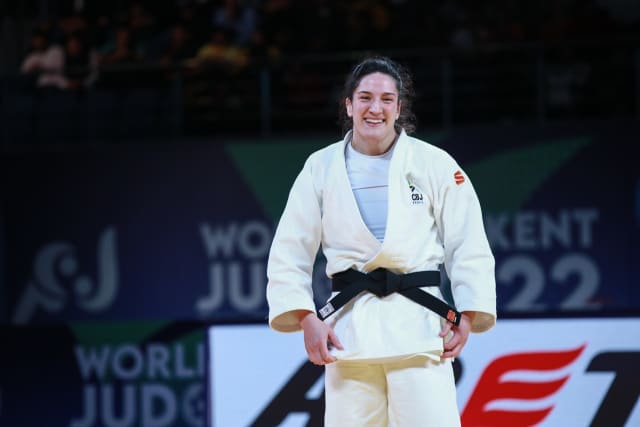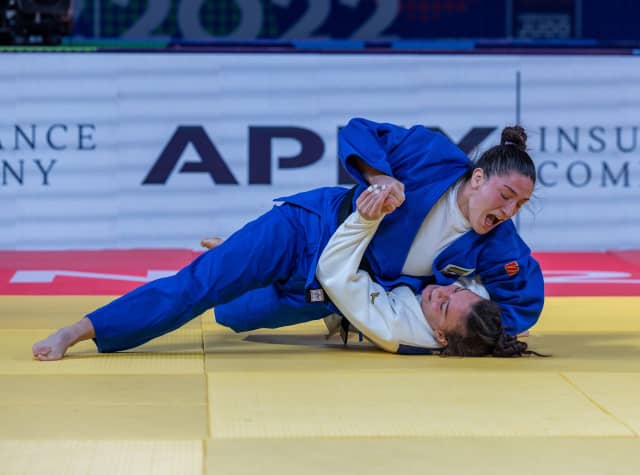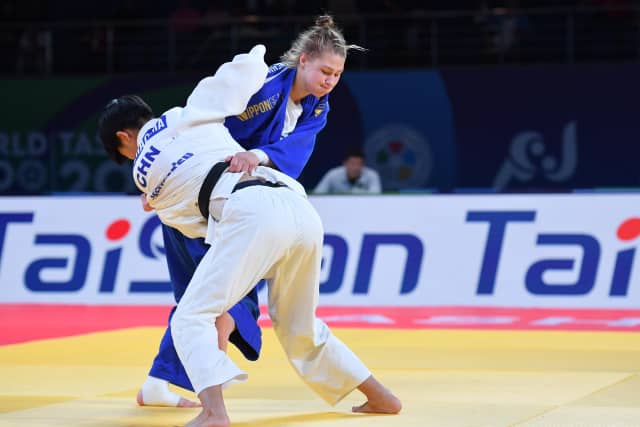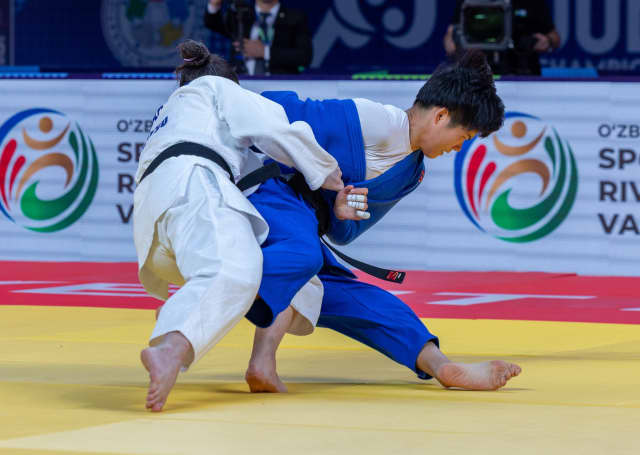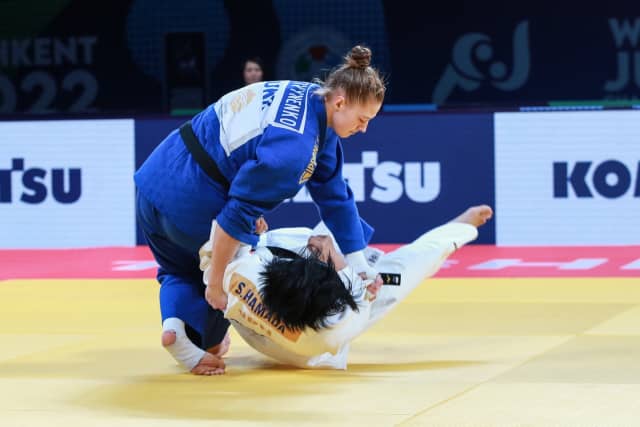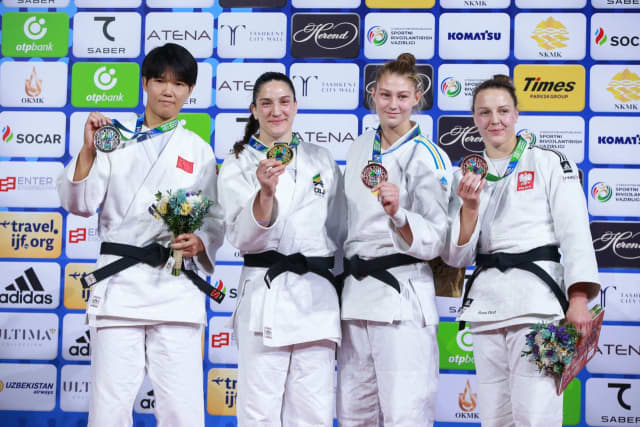We have not said that the French Madeleine Malonga, former world champion, world and Olympic runner-up, packed her suitcase and returned to the airport after a very poor first fight against the Korean Hyunji Yoon, who won in Portugal at the beginning of the year but she, in this context, should have suffered the wrath of the Frenchwoman. In the end, the one who got angry was Malonga and for a year she has given the impression that she has not progressed, she has not reinforced her technical panoply, she does not offer anything new. We have not said that Inbar Lanir lost to Kosovar Loriana Kuka and that Israel is still without a medal in Tashkent. Nor have we said that the Dutchwoman and sure thing for the podium, Guusje Steenhuis, took the same bus as Malonga because she also had to advance her return flight. Above all, we have not said that a Brazilian who could be the grandmother of the category and a Chinese athlete who is known a little in Asia but very little in the rest of the world, made a huge splash. We start with the grandmother, it is a matter of respect and we say it with all the love in the world. Mayra Aguiar has the most beautiful story of the week and she deserves a happy ending. For those who do not study, here is a small summary. She is 31 years old, she has been world champion twice, is a three-time Olympic medallist, she has 48 medals between Games, world championships, masters, grand slams and grand prix. She suffered a terrible knee injury and it held her back for a long time but she is still one of the best competitors in history. Aguiar has returned to the World Judo Tour slowly, without forcing anything, little by little, without a doubt keeping an idea in mind but nobody bet on her in the Tashkent final; no-one except her coach, some partner and above all her, because she was the only one who knew her true state of form and she showed it from the first fight. For you to understand better, the level of the Brazilian was the same as that which propelled her to her first world title, to which we must add a considerable percentage of experience and maturity. Her quarter-final win against Japan's Hamada was a showpiece, with a perfect ippon that not many people are capable of pulling off against such an opponent.
The semi-final against the German Boehm was a formality and in the final a rival awaited who did not enjoy the confidence of those who predicted and we are the first to have made the mistake of underestimating her. She is Zhenzhao Ma, she comes from China, which is breaking news in itself, because we have not been able to evaluate Chinese judoka for ages due to the global pandemic. Ma eliminated the Korean who had defeated Malonga, got rid of the Polish Pacut-Kloczko in the quarter-finals and there was no-one to stop her, not even the excellent Ukrainian Lytvynenko in the semi-finals. Ma won and she did it scoring, showing the judo that we like, the one that always goes forward, the one that doesn't speculate with the shido. By qualifying for the final, the Chinese entered a new dimension, a world unknown to her but in which Aguiar moves like a fish in water. Before starting, without knowing the outcome, the only thing that could be affirmed was that the seven years difference between the Brazilian and the Chinese were about thirty at the level of sports demand, because in professional sports you have to double, sometimes triple, any time comparison. In any case, it was going to be a final between those who competed best, those who best knew how to take advantage of the berezina suffered by the favourites; a chaotic deserved ending.
Perhaps Ma did not understand that Aguiar had not crossed half the world to have an ice-cream and visit Samarkand. No, the Brazilian wanted something else, and since she is very nice, it took her seventeen seconds to explain it to Ma. Waza-ari. Apart from getting ahead on the scoreboard, what Aguiar offered was a kind of experience, one that she has accumulated and that represents a treasure that few can match. The Brazilian cut the pace of the Chinese, attacked enough not to be reprimanded for passivity, blocked Ma and played with the shido mattress. Ma did not give up and it is fair to congratulate her on her great tournament, but we also recommend that she watches the fight and soak up Aguiar's experience, because she will surely be able to use those teachings in the future. As for Aguiar, seeing her become world champion for the third time after the ordeal of injuries, fills us with pride and teaches the youngest, or those who lose hope, that it is never too late to do great things, historic things.
Hamada and Lytvynenko had never fought together, not even for a bronze medal. A colleague asked us for a forecast and we kicked him out of the stadium, by now we were tired of making mistakes. Ok, presentation from our wonderful speaker, twenty-two seconds of combat, a bit of kumi-kata and Lytvynenko pulverises Hamada, yes, yes, the Olympic champion, with a sensational ippon that we will never get tired of seeing replayed.
The Polish Beata Pacut-Kloczko was endorsed by her victory at the Tel Aviv Grand Slam. As for the German Alina Boehm, she won the bronze in Mongolia, but above all she is the European champion and had the pleasure of eliminating her compatriot Wagner in the quarter-finals. The fight was far from an exhibition like Lytvynenko's, but rather a very tactical one, with neither showing their cards, until the Pole surprised Boehm with waza-ari followed by wonderful ne-waza which served to consume time and drive an unarmed Boehm to despair. Osea-komi, ippon and bronze.
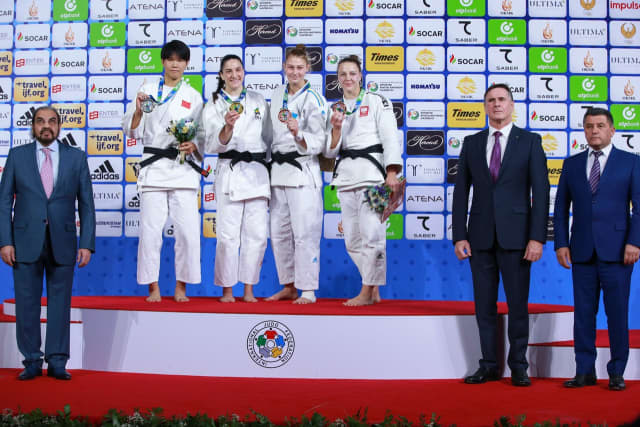
You know, from now on we will stop calling it the world championship and instead we will talk about chaos theory.

